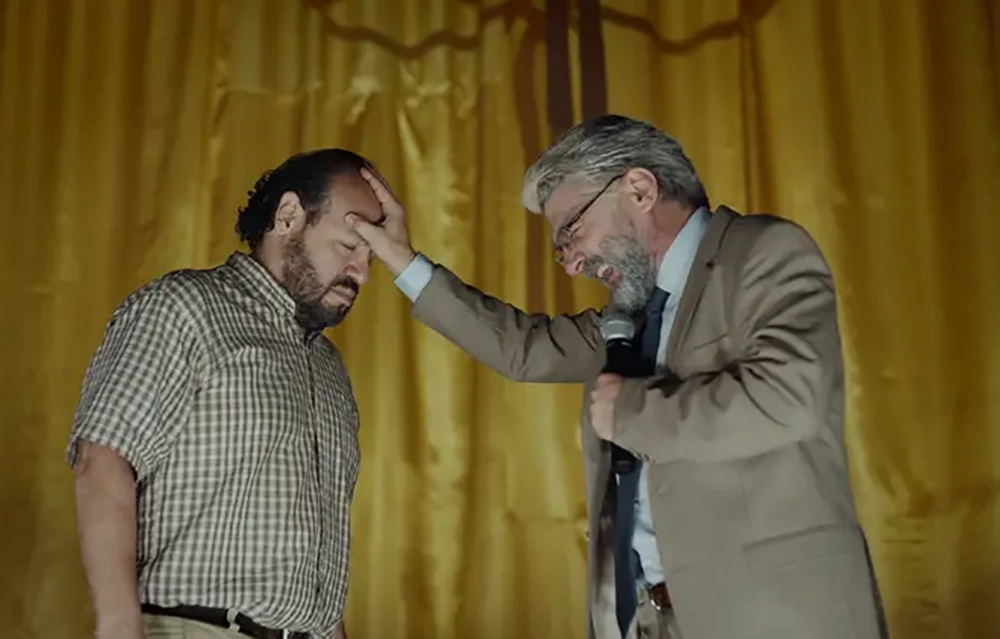“The Visitor” is a Spanish-language feature playing at this year’s Tribeca Festival. It is about a father and ex-convict (Enrique Aráoz) who returns to his hometown in Bolivia and tries to reconnect with his estranged daughter (Svet Mena). The film has some flaws — notably its short run-time and lack of character development — but still offers food for thought; it examines family, the stigma that follows prison release, and mistakes that haunt you through the years.
What is striking about Martín Boulocq’s film here is the detached way he invites you into the picture; also great is the brooding, subtle way the film’s star, Enrique Aráoz paints his character, Humberto. The town looks like a quaint place to live; and Humberto, recently released from prison, slowly tries to pick up his life. Boulocq sets the stage well. We see shots of Humberto reconnecting with his mother and a friend, the latter who warns him “a stigma is a stigma.”
The Strength of a Father and a Daughter
Humberto also attempts to reconnect with his daughter, Aleida (Svet Mena). In their opening sequence together, both sit facing each other without sharing a word. We get the impression that Aleida might possibly be mad at her father for his absence. However, their subsequent scenes show that Aleida truly loves her father; their scenes make up some of the best parts of the movie. One of my favorites has to be a night the two spend on the rooftops of their town, overlooking the lights of the city, just talking. However, another as they have dinner with Humberto’s mother is equally charming. Aráoz and Mena have good chemistry together, and you really believe they are father and daughter.
‘The Visitor’ has good acting by Aráoz and Mena, and a good bond between father and daughter…”
In a small town like this, convicts are bound to have a hard time; and in “The Visitor,” it’s Aleida’s grandmother and grandfather (Mirella Pascual, César Troncoso) who try and stand in the way. Most of the time, Aleida’s grandmother, Elizabeth, only stands and looks foreboding; however, her grandfather, who also happens to be the town Pastor, takes a more forward approach. This initially takes the form of hiding his reluctance to accept Humberto behind his evangelicalism; he begs him to confess his sins before a large parish crowd (we learn that Humberto went to jail for issues involving alcoholism, but further details aren’t divulged).

Later, however, he will judge and admonish Humberto for his attempts at finding work (selling cell phone cards door-to-door) or using people from the parish to help him. People in Humberto’s life keep telling him to “get a real job,” but we see Humberto’s family’s reluctance to even accept him, and we know how hard it is for ex-convicts to secure meaningful employment.
Missing Some Important Character Development
It’s here I feel the film breaks down, as “The Visitor” doesn’t detail Humberto’s previous crimes well, and we see his earnest efforts to secure work and stay sober. Given this — and his daughter’s pure love of him — it’s difficult to understand why her grandparents give Humberto such a hard time and seek to keep him from her. Was there an accident involved? Abuse? A death? Answers aren’t forthcoming; and as a result, “The Visitor” casts Elizabeth and the Pastor as the true antagonists of this film, often without purpose. A scene toward the film’s end — as the Pastor basically forces Aleida to get baptized — adds to the confusion. One of the film’s crowning achievements is making us care for Humberto and wanting to see him succeed. When he doesn’t, it leaves a wound on our hearts, and it’s hard to see the reason why the film took this direction.
One of the film’s crowning achievements is making us care for Humberto…”
Other than that, “The Visitor” is an accomplished effort. It has good acting by Aráoz and Mena, a good bond between father and daughter, and makes a case for family reconciliation. It’s filmed well, and the cinematography is appropriate; it shows majestic shots of its Bolivian village, as well as close-up, pensive shots of Humberto as he goes about the job of fixing his life. The film is a little frustrating in terms of its character development; but it did win ‘Best Screenplay in an International Narrative Feature,’ and is definitely worth checking out.
“The Visitor” premiered in this year’s Tribeca Festival, winning ‘Best Screenplay in an International Narrative Feature.’
Support the Site: Consider becoming a sponsor to unlock exclusive, member-only content and help support The Movie Buff!